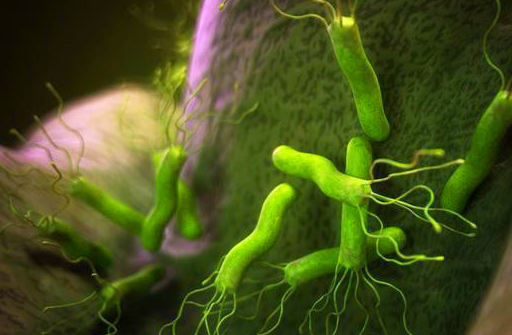The symptoms of Helicobacter pylori infection mainly include acid reflux, belching, heartburn, stomach pain, nausea, vomiting, and may induce chronic gastritis and ulcerative digestive diseases.
According to reports from the World Health Organization, individuals infected with Helicobacter pylori may have a 2-3 times higher risk of developing stomach diseases. Helicobacter pylori, abbreviated as Hp, is a Gram-negative, microaerophilic bacterium primarily residing in the stomach and duodenum.
It was first successfully isolated from gastric mucosal biopsy tissue of patients with chronic gastritis in 1983, and it is currently the only known microorganism capable of surviving in the human stomach.
So why does Helicobacter pylori erode our stomach lining?
Hp is an anaerobic bacterium, while the human stomach is a microaerobic environment. The protective “cloud of ammonia” secreted by Hp allows it to survive in the stomach without being affected by stomach acid.
A toxin secreted by Hp stimulates and damages the tissues of the gastric mucosa, leading to excessive stomach acid production, which in turn causes gastritis, gastrointestinal ulcers, and chronic atrophic gastritis.
What are the common examination methods for Helicobacter pylori?
1. Serological testing: This involves testing for Hp antibodies, a method used in non-present infection detection, reflecting the individual’s infection status over a period. After Hp infection, antibodies take some time (approximately 1-3 months) to develop;
After Hp eradication, serum Hp antibodies may remain positive in the short term, and the antibodies will not immediately disappear; they gradually decrease over time.
2. 13C/14C-urea breath test: This method is rapid, non-invasive, suitable for a wide range of people, and is one of the best diagnostic methods for detecting current Hp infections. The 13C/14C-urea breath test can only detect the presence of Hp in the stomach, not the nature of the upper digestive tract lesions, so it cannot replace gastroscopy.
3. Fecal antigen testing:
After Hp infection, it settles on the surface of the gastric epithelial cells. When gastric mucosal epithelial cells shed, Hp sheds with them and is excreted through the gastrointestinal tract in feces, making it detectable through feces.
4. Rapid urease test: Through gastroscopy, gastric mucosal tissue is taken and tested for urease produced by Hp in the mucous layer on the surface of the gastric mucosa for diagnosis.
Furthermore, there are histological and bacteriological testing methods, both of which require gastric mucosal tissue to be taken through gastroscopy before testing.
To eradicate Helicobacter pylori, consume these 4 substances during the Dog Days:
1. Gugudin: Gugudin, also known as the “Queen of Herbs,” is recorded in the Qing Dynasty’s “Complete Collection of Evidences and Treatment in Surgery,” where it is said to treat stomach ache.
Moreover, the “Chinese Journal of Modern Internal Medicine” has reported that combined use of Gugudin and Omeprazole can treat Helicobacter pylori infections with an efficacy rate of over 90%, with relatively few side effects.
Gugudin enters the stomach, has anti-inflammatory and pain-relieving effects, repairs the gastric mucosa, prevents and eliminates Helicobacter pylori, and assists in treating underlying gastric diseases such as gastritis and gastric ulcers.
Experts suggest that Gugudin is cool in nature, so it is recommended to add some wild rose petals. By preparing Gugudin and wild rose tea, one can significantly reduce its cooling effect, making it suitable for most individuals. Long-term consumption may help in nourishing the stomach and eradicating bacteria.
2. Vitamin A: Vitamin A enhances the metabolism of sugars, fats, proteins, and other substances, promotes intestinal motility, aids in digestion and absorption of food, prevents bloating and indigestion.
Vitamin A not only alleviates inflammation but also has powerful antioxidant properties, primarily protecting the mucous membranes. Supplementing with vitamin A can repair the gastric mucosa, address mucosal damage, gastric ulcers, and reduce the risk of Helicobacter pylori infection.
3. Antibacterial foods:
Garlic: A natural antibiotic, garlic has excellent antibacterial, anti-inflammatory, and detoxifying effects. It can also inhibit the growth of Helicobacter pylori. Garlic needs to be crushed into a paste and left in the air for about 3 minutes to generate allicin, which has antibacterial properties. Additionally, vegetables like broccoli, cabbage, and others can be beneficial.
4. Honey: Research has shown that honey can inhibit the occurrence of Helicobacter pylori. It has a soothing effect on the intestines, repairs damaged gastric mucosa, and protects the gastrointestinal tract.
Having a glass of honey water after meals can reduce stomach damage, provide long-term benefits for skin beauty, anti-aging effects, and facilitate gastrointestinal health.
Stomach health is a long-term commitment, follow these 4 practices, and your stomach will improve over time!
1. Drink warm water after meals: Drinking warm water is essential for protecting the gastric mucosa. The temperature should be around 35-40°C, which is the most comfortable temperature for the gastrointestinal tract. Avoid choosing beverages, especially carbonated and alcoholic drinks.
2. Chew food thoroughly and eat slowly: Chewing food thoroughly aids in breaking it into small pieces, reducing the digestive burden on the stomach. Try to finish a meal within about 15 minutes to allow oral salivary amylase to better mix with food for digestion.
3. Quit smoking if possible: Smoking introduces chemical substances from smoke into the digestive tract and directly stimulates the gastric mucosa, leading to vessel constriction, spasms, stomach pain, or exacerbation of conditions.
4. Avoid raw and cold foods: Many people enjoy raw fish, seafood, which are inherently cooling foods. Consuming excessive amounts can irritate the intestines and stomach and also carry a significant amount of bacteria, promoting Helicobacter pylori growth.


